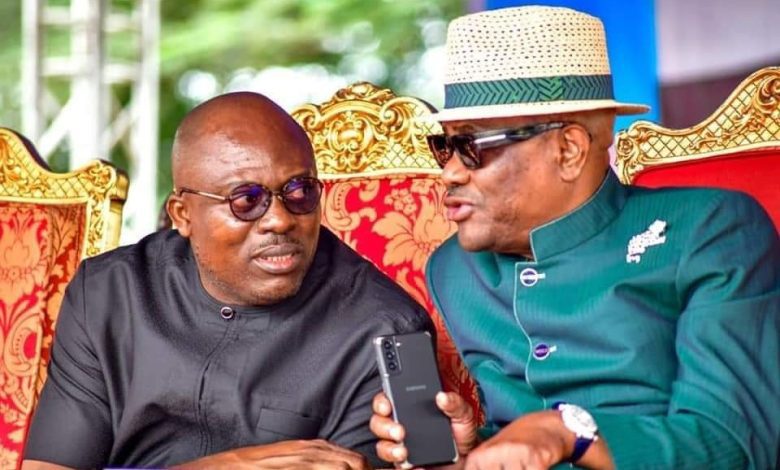Wike Calls Fubara “My Boy” Amid Rivers Political Crisis: A New Twist in a Deepening Rift.
In a dramatic turn of events, Nyesom Wike, the Minister of the Federal Capital Territory and former Governor of Rivers State, has publicly referred to his estranged successor, Governor Siminalayi Fubara, as “my boy.”
The remark has reignited political tensions in Rivers State, casting fresh light on the power struggle between the once-allied political heavyweights.
The Origins of the Fubara’s Political Fallout With Wike
Siminalayi Fubara was largely an unfamiliar name in Rivers politics until Wike handpicked him to succeed him in the 2023 gubernatorial election.
As governor, Wike used his influence within the People’s Democratic Party (PDP) to secure Fubara’s candidacy and eventual victory. According to Wike, Fubara didn’t even purchase the nomination form himself; he was handed the opportunity and promised support to the top.
ALSO READ: Priscilla Ojo Pregnancy Rumors Go Viral Ahead of Final Wedding with Juma Jux.
However, what began as a smooth political succession quickly spiraled into conflict. After assuming office, Fubara reportedly began distancing himself from Wike’s camp, triggering accusations of betrayal. Wike, in a televised interview, declared he would never again support Fubara, stating, “I won’t do that in my political life. Everyone knows me.”
River State Assembly in Turmoil
The fallout led to a full-blown political crisis, splitting the Rivers State House of Assembly into two rival factions. One, led by Martin Amaewhule and consisting of 27 lawmakers, backed Wike. The other, led by Victor Jumbo with just three members, supported Fubara. Legal disputes over which faction held legitimate power further complicated governance in the state.
Tensions peaked when Fubara submitted commissioner nominations without consulting Wike. This bold move sparked impeachment threats, to which Fubara responded by ordering the demolition of the state Assembly complex—officially due to structural issues, but widely seen as a strategy to preempt removal from office.
Tinubu Steps In: State of Emergency Declared
Amid escalating instability, President Bola Tinubu intervened on March 18, 2025, declaring a state of emergency in Rivers State. The president suspended Fubara, his deputy, and all Assembly members, appointing a retired Navy vice admiral to oversee governance temporarily.
This intervention sparked nationwide outrage. Critics accused Tinubu of exploiting the crisis to tighten federal control. Influential voices like former President Goodluck Jonathan and Nobel laureate Wole Soyinka condemned the move, warning it posed a serious threat to Nigeria’s democratic fabric.
Moves Toward Reconciliation—Or Just Optics?
Despite the hostility, reconciliation efforts have surfaced. Former Ogun State Governor Olusegun Osoba reportedly brokered a meeting between Wike and Fubara at Wike’s Abuja residence. Insiders say Fubara apologized for past grievances, and both parties are expected to meet again.
Still, not everyone is optimistic. Former Ekiti State Governor Ayodele Fayose has dismissed the chances of a truce, claiming the trust between the two is irreparably broken.
“My Boy” – A Loaded Statement
Wike’s recent statement to Fubara as “my boy” has stirred fresh controversy. While some interpret it as a hint at reconciliation, others see it as patronizing—a subtle reminder of Wike’s perceived seniority and influence. Either way, the comment reflects the complex layers of their relationship: one that oscillates between mentorship, rivalry, and political brinkmanship.
Impact on Rivers State Governance
The ongoing feud has had damaging consequences for governance in Rivers State. Legislative activities have stalled, development projects are in limbo, and the political climate remains tense.
Former President Jonathan has urged both leaders to put aside personal differences for the good of the people, stressing that collaboration is essential for the state’s progress.
Final Thoughts
The political drama unfolding in Rivers State is more than a personal feud—it’s a case study in the dangers of unchecked political patronage and the fragility of democratic institutions. As Wike and Fubara grapple with their fractured alliance, the real cost is borne by the citizens of Rivers State. Whether the recent reconciliation efforts will lead to genuine peace or are merely the calm before another political storm remains to be seen.

